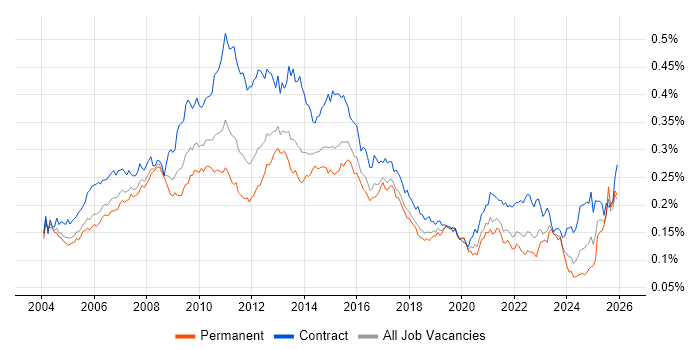Reporting Analyst
UK
The median Reporting Analyst salary in the UK is £40,000 per year, according to job vacancies posted during the 6 months leading to 15 June 2025.
The table below provides salary benchmarking and summary statistics, comparing them to the same period in the previous two years.
| 6 months to 15 Jun 2025 |
Same period 2024 | Same period 2023 | |
|---|---|---|---|
| Rank | 678 | 851 | 799 |
| Rank change year-on-year | +173 | -52 | +291 |
| Permanent jobs requiring a Report Analyst | 37 | 78 | 136 |
| As % of all permanent jobs advertised in the UK | 0.066% | 0.071% | 0.15% |
| As % of the Job Titles category | 0.073% | 0.074% | 0.16% |
| Number of salaries quoted | 13 | 57 | 72 |
| 10th Percentile | £32,100 | £27,500 | £32,550 |
| 25th Percentile | £32,500 | £31,250 | £35,500 |
| Median annual salary (50th Percentile) | £40,000 | £36,750 | £40,000 |
| Median % change year-on-year | +8.84% | -8.13% | -20.00% |
| 75th Percentile | £43,750 | £49,500 | £55,000 |
| 90th Percentile | £53,500 | £63,000 | £71,250 |
| UK excluding London median annual salary | £40,750 | £35,875 | £38,000 |
| % change year-on-year | +13.59% | -5.59% | +8.57% |
All Permanent IT Job Vacancies
UK
For comparison with the information above, the following table provides summary statistics for all permanent IT job vacancies. Most job vacancies include a discernible job title that can be normalized. As such, the figures in the second row provide an indication of the number of permanent jobs in our overall sample.
| Permanent vacancies in the UK with a recognized job title | 50,366 | 104,718 | 83,671 |
| % of permanent jobs with a recognized job title | 89.89% | 94.79% | 91.17% |
| Number of salaries quoted | 26,574 | 73,870 | 54,667 |
| 10th Percentile | £27,500 | £28,500 | £32,500 |
| 25th Percentile | £39,500 | £38,603 | £45,000 |
| Median annual salary (50th Percentile) | £55,000 | £52,500 | £60,000 |
| Median % change year-on-year | +4.76% | -12.50% | - |
| 75th Percentile | £73,750 | £70,000 | £80,000 |
| 90th Percentile | £95,000 | £90,000 | £100,000 |
| UK excluding London median annual salary | £50,055 | £50,000 | £53,500 |
| % change year-on-year | +0.11% | -6.54% | +6.47% |
Report Analyst
Job Vacancy Trend
Job postings that featured Report Analyst in the job title as a proportion of all IT jobs advertised.

Report Analyst
Salary Trend
3-month moving average salary quoted in jobs citing Report Analyst.
Report Analyst
Salary Histogram
Salary distribution for jobs citing Report Analyst over the 6 months to 15 June 2025.
Report Analyst
Top 12 Job Locations
The table below looks at the demand and provides a guide to the median salaries quoted in IT jobs citing Report Analyst within the UK over the 6 months to 15 June 2025. The 'Rank Change' column provides an indication of the change in demand within each location based on the same 6 month period last year.
| Location | Rank Change on Same Period Last Year |
Matching Permanent IT Job Ads |
Median Salary Past 6 Months |
Median Salary % Change on Same Period Last Year |
Live Jobs |
|---|---|---|---|---|---|
| England | +154 | 32 | £41,500 | +12.93% | 67 |
| UK excluding London | +171 | 23 | £40,750 | +13.59% | 33 |
| Work from Home | +140 | 20 | £35,000 | +7.69% | 41 |
| London | +113 | 12 | £38,500 | -40.77% | 45 |
| North of England | +60 | 10 | £45,000 | +38.46% | 14 |
| North West | +15 | 10 | £45,000 | +22.45% | 10 |
| South East | +93 | 5 | £42,500 | +6.25% | 9 |
| Scotland | +113 | 3 | £35,000 | - | 6 |
| East of England | +40 | 3 | £43,000 | -12.24% | |
| West Midlands | +71 | 2 | £40,750 | +5.16% | 1 |
| Midlands | +68 | 2 | £40,750 | +35.49% | 1 |
| South West | +111 | 1 | - | - | 2 |
Report Analyst Skill Set
Top 30 Co-occurring Skills and Capabilities
For the 6 months to 15 June 2025, Report Analyst job roles required the following skills and capabilities in order of popularity. The figures indicate the absolute number co-occurrences and as a proportion of all permanent job ads featuring Report Analyst in the job title.
|
|
Report Analyst Skill Set
Co-occurring Skills and Capabilities by Category
The follow tables expand on the table above by listing co-occurrences grouped by category. The same employment type, locality and period is covered with up to 20 co-occurrences shown in each of the following categories:
